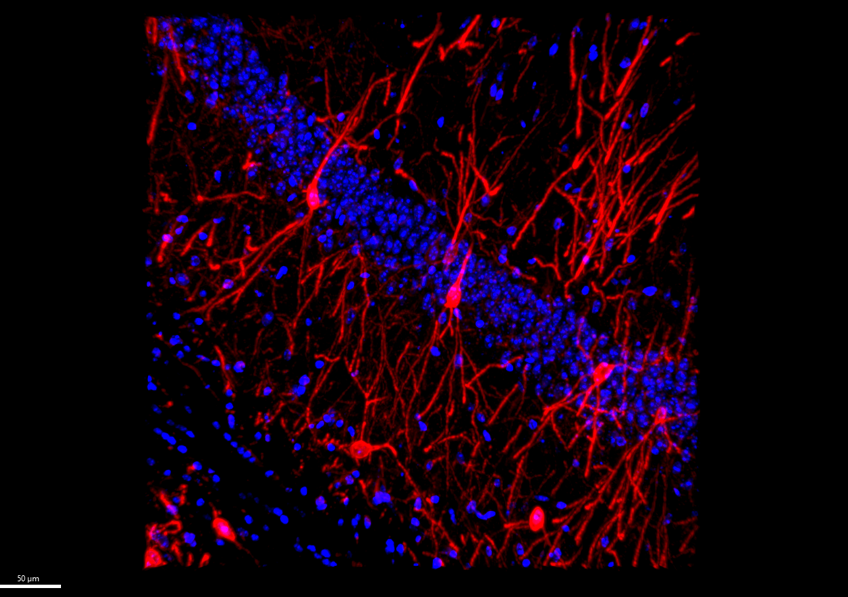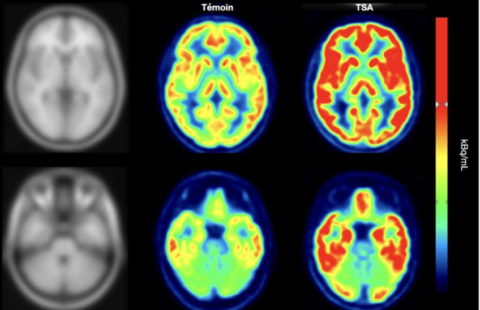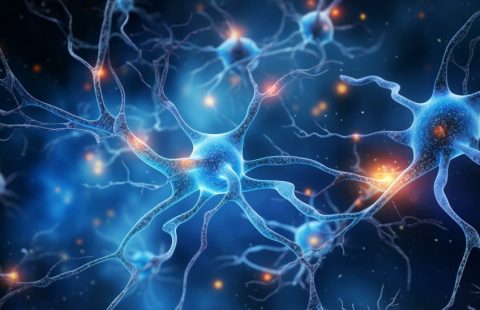 In red, the increased A2A receptors in the neurons of a mouse hippocampus. In blue, the cell nuclei (DAPI staining). © Émilie Faivre
In red, the increased A2A receptors in the neurons of a mouse hippocampus. In blue, the cell nuclei (DAPI staining). © Émilie Faivre
In France, 900 000 people have Alzheimer’s disease or a related condition. The risk of developing Alzheimer’s depends on genetic and environmental factors. Among these factors, various epidemiological studies suggest that the regular consumption of moderate amounts of caffeine slows age-related cognitive decline and the risk of developing the disease. In a new study[1], researchers from Inserm, Lille University Hospital and Université de Lille at the Lille Neuroscience and Cognition research centre have taken a step further in understanding the mechanisms underlying its development. They have shown that the pathological increase in certain receptors in the neurons at the time of disease onset promotes a loss of synapses, and as such the early onset of memory impairments in an animal model of the disease. Their findings also confirm the utility of conducting clinical trials to measure the effects of caffeine on the brains of patients at an early stage of the disease. These findings have been published in Brain.
Alzheimer’s disease is characterised by disorders of memory, executive function and orientation in space and time. It results from the slow degeneration of the neurons, which begins in the hippocampus (essential for memory) and then spreads to the rest of the brain. Sufferers present two types of microscopic brain lesions: senile plaques (or amyloid plaques) and neurofibrillary degeneration (or tau pathology), which contribute to neuron dysfunction and disappearance[2].
Studies had already shown that the expression of certain receptors, known as A2A receptors, was found to be increased in the brains of patients affected by Alzheimer’s disease in the hippocampus. However, the impact of such dysregulation on the development of the disease and associated cognitive disorders had remained unknown until now. In a new study, a team led by Inserm researcher David Blum took a closer look at this question.
The scientists were able to reproduce an early increase[3] in the expression of the adenosine A2A receptors, as observed in the brains of patients, in a mouse model of Alzheimer’s disease that develops amyloid plaques. The objective was to assess the consequences of this increase on the disease and to describe the mechanisms involved.
The results of their research show that the increase in A2A receptors promotes the loss of synapses[4] in the hippocampus of ‘Alzheimer’s mice’. This causes the early onset of memory impairments in the animals. The scientists then showed that a dysfunction of certain brain cells – the microglial cells, partly responsible for the brain inflammation seen in the disease – could be involved in the loss of synapses, in response to an increase in the A2A receptors.
Similar mechanisms had already previously been described by the team, this time in another model of the disease developing tau lesions[5].
‘These findings suggest that the increased expression of the A2A receptors alters the relationship between neurons and microglial cells. This alteration could be the cause of an escalation of effects leading to the development of the memory impairments observed,’ explains Émilie Faivre, co-last author of the study and researcher at the Lille Neuroscience and Cognition centre (Inserm/Université de Lille/Lille University Hospital).
Caffeine: An interesting treatment avenue for the early prevention of cognitive decline?
Several studies had already suggested that regular and moderate caffeine consumption (equivalent to 2 to 4 cups of coffee per day) could slow the cognitive decline associated with ageing and the risk of developing Alzheimer’s disease.
In 2016, the same research team had described one of the mechanisms by which caffeine could have this beneficial effect in animals, reducing the cognitive disorders associated with Alzheimer’s disease. The scientists then showed that the effects of caffeine were linked to its ability to block the activity of the adenosine A2A receptors – the same receptors whose expression is abnormally increased in the brains of people with Alzheimer’s[6].
‘By describing in our new study the mechanism by which the pathological increase in A2A receptor expression causes a cascade of effects leading to a worsening of memory impairment, we confirm the relevance of therapeutic avenues that could act on this target. We therefore once again emphasise the utility of testing caffeine in a clinical trial on patients with early forms of the disease. Indeed, we can imagine that by blocking these A2A receptors, whose activity is increased in patients, this molecule could prevent the development of memory impairment or even other cognitive and behavioural symptoms,’ continues Blum, Inserm Research Director and co-last author of the study.
A phase 3 clinical trial[7], run by Lille University Hospital, is ongoing. Its objective is to evaluate the effect of caffeine on the cognitive functions of patients with early to moderate forms of Alzheimer’s disease.
[1]This research was supported by Fondation Alzheimer, FRM, ANR, CoEN (LICEND), Inserm, Université de Lille, Lille University Hospital and labEx Distalz (Development of Innovative Strategies for a Transdisciplinary Approach to Alzheimer’s Disease) as part of France’s Investments for the Future programme.
[2] Read the Inserm Report on Alzheimer’s disease and consult its Graphic novel which explains the cellular and molecular mechanisms involved in its development.
[3] At a stage during which the animals are not yet usually suffering from memory impairments.
[4] Zones that enable the transmission of information between neurons.
[5] Exacerbation of C1q dysregulation, synaptic loss and memory deficits in tau pathology linked to neuronal adenosine A2A receptor, Brain, Volume 142, Issue 11, November 2019, Pages 3636–3654, https://doi.org/10.1093/brain/awz288
[6] Read the press release
[7] The CAFCA phase 3 clinical trial is being conducted by neurologist Thibaud Lebouvier, in conjunction with the LilNCog laboratory and the Lille University Hospital Memory Centre. https://www.cafca-alzheimer.fr/
These contents could be interesting :


